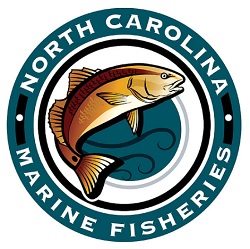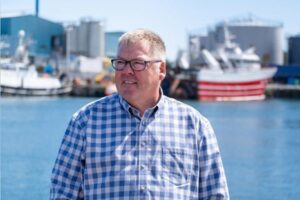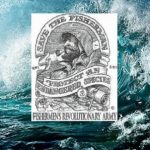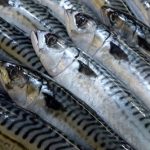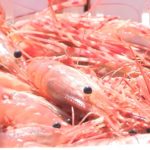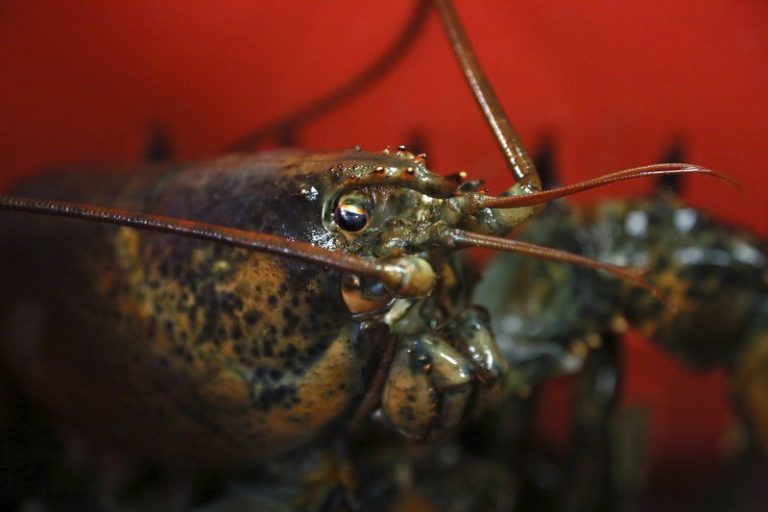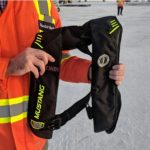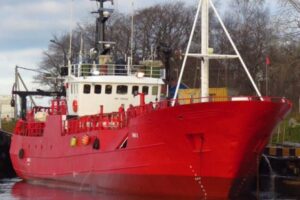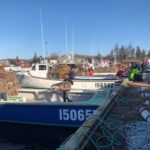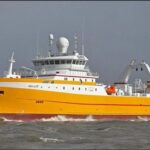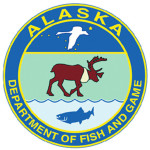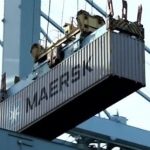Tag Archives: Gill nets
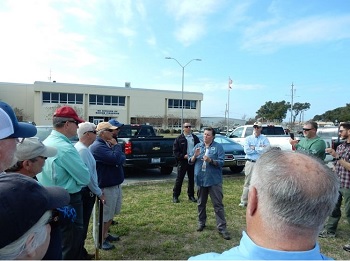
Protestors gather outside NCDMF Monday to oppose new flounder, shrimp rules
The Coastal Conservation Association’s North Carolina chapter organized the protest Monday. About 33 participants stood out front of the division building on Arendell Street, holding up signs with messages expressing their displeasure with recent actions the N.C. Marine Fisheries Commission took in regards to the management of the southern flounder and shrimp fisheries. Some passing motorists honked their horns in response to the protest. The association is a recreational fishing nonprofit dedicated to coastal environment conservation. CCA-NC Carteret County chapter president Van Parrish was leading the protest Monday. >click to read< 16:04
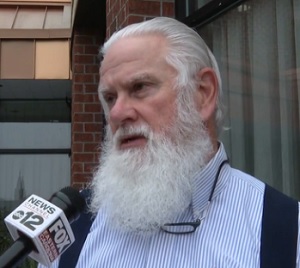
North Carolina: Decision on gill nets delayed, officials say more information is needed
No decision was made Thursday by the Marine Fisheries Commission on whether or not large mesh gill nets will be allowed in North Carolina. The decision was delayed because board members said they want more information. Commissioners are torn about two things, if these nets should be used above ferry lines and whether they should be phased out of southern flounder fishing. For many fishermen like Jerry Schill, commercial fishing with large mesh gill nets have been a way of life. He doesn’t want them to be banned. Video, >click to read< 08:41
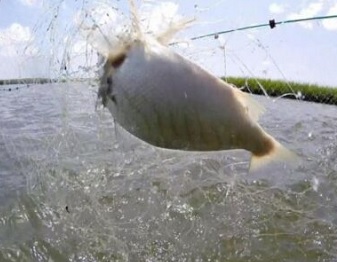
Political science drives net ban referendum – most people don’t even know what a gill net is
Cape Carteret town commissioners’ decision last week to endorse a statewide referendum on the use of gill nets in the state’s coastal waters indicates a willingness to relegate complex scientific issues to a political decision. This devalues the expertise of biologists and scientists in the state’s Division of Marine Fisheries who regularly make these decisions on behalf of all stakeholders, to help one special group – recreational fishermen. Commissioner Jeff Waters, in casting the only opposing vote, correctly noted that fewer gill nets are being used every year, But Mr. Waters offered a far more compelling reason not to support the bill and that is most people who would vote in the referendum, “don’t even know what a gill net is and wouldn’t know what they’re voting on and so would just vote against gill nets.” >click to read< 19:11
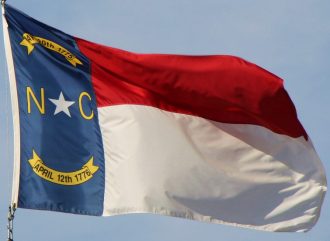
Cape Carteret commission endorses anti-gill net, net ban legislation
Cape Carteret commissioners Monday night endorsed state legislation that would set up a statewide referendum on whether to ban the use of gill nets and other “entangling” nets in coastal waters. The action to endorse House Bill 513 came during the panel’s regular meeting in town hall and virtually via GoToMeeting and was proposed by Commissioner Steve Martin. It passed by a 4-1 vote, with Commissioner Jeff Water opposed. N.C. Fisheries Association Executive Director and commercial fisherman Glenn Skinner has voiced opposition to the proposed referendum and net restrictions. >click to read< 17:04
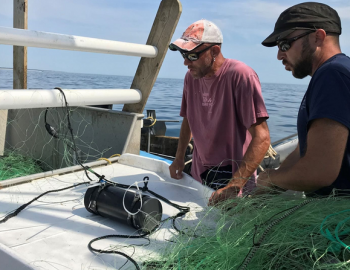
The costs of depredation: Underwater Cameras Tackle Tough Questions for Fishery
Scientists at the Woods Hole Oceanographic Institution (WHOI) and the Center for Coastal Studies (CCS) are working with local fishermen on Cape Cod to understand exactly what happens when seals and other marine mammals invade a fishing net to forage.,,, The costs of depredation—when marine animals prey on fish caught in nets—can be high on both fronts. On the economic side, it can reduce the amount of sell-able fish and lead to torn fishing nets. “A five-inch opening in the net can quickly become a 15-inch hole when a seal gets caught and tries to free itself,” said Doug Feeney, a commercial fisherman based in Chatham, Massachusetts. >click to read< 12:30
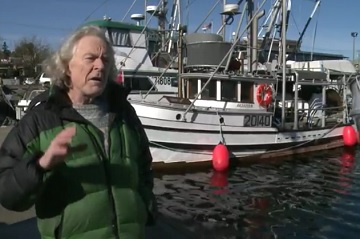
Salmon gill net fishing ban narrows focus to Columbia River
A push to ban non-tribal gill net fishing for salmon on the Columbia River is no shock to Pete Knutson, who has witnessed several similar attempts like it in his lifetime. “You can sell it to people who know nothing about the resource, and it sounds like a good idea,” Knutson said. Knutson owns Loki Fish Company, a business his entire family has helped build. It’s families like his that he’s worried about if the ban passes. “If you’re concerned about the resource, you want to keep those portions of the population that are living from the resource in business because they are the best stewards of the resource,” Knutson explained. >click to read<15:31
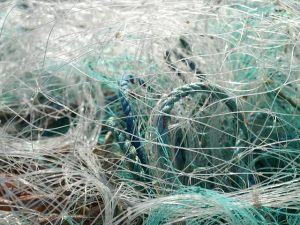
Defenders of right whales pursue limits on aquaculture and fixed gear fisheries
Right whale defenders are now taking aim at aquaculture as they try to protect the highly endangered species from deadly fishing gear entanglements. Advocates usually focus on the lobster industry,,,Right whale defenders are now taking aim at aquaculture as they try to protect the highly endangered species from deadly fishing gear entanglements. Advocates usually focus on the lobster industry,,, Researchers from Whale and Dolphin Conservation, a U.K.-based nonprofit that advocates for marine animals, want regulators to reduce surface-to-seabed lines in all Gulf of Maine fisheries, not just lobstering. They name aquaculture and gill net as rope-based fishing methods that are known to entrap, injure and kill both humpback and right whales. They say it’s not fair for regulators, who are meeting next week, to seek rope reduction from lobstermen while issuing permits for other fisheries that use similar rope. >click to read<20:40
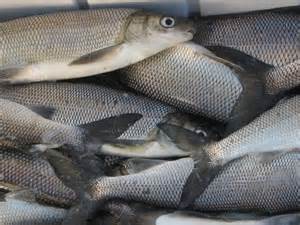
Inland Fisheries: DNR proposes a study on the effect of commercial gill nets on Lake Michigan
The Department of Natural Resources has proposed a study of the impacts of commercial gill netting on non-target sport fish such as chinook salmon and brown trout in the Wisconsin waters of Lake Michigan. Commercial fishers in Zone 3 have lobbied the agency for the ability to use large mesh gill nets to catch lake whitefish. The gear has been prohibited in the zone, which covers the Wisconsin waters of Lake Michigan south of Bailey’s Harbor, to prevent bycatch and mortality of sport fish as well as user conflicts. However, large mesh gill nets are allowed for commercial fishing in northern Lake Michigan and part of Green Bay. Commercial fishers have requested the same opportunity in Zone 3. click here to read the story 15:11
FISH-NL – Northern Cod – “Why is DFO setting us up to fail?”
 Earlier this year, DFO gave harvesters two options for fishing northern cod off Newfoundland’s east coast and Labrador for 2017: 1) fish the entire season at the weekly limit; or 2) fish only from Sept. 17th-Nov. 30th at double the weekly limit. Harvesters who choose option one, and have one cod IQ (individual quota), can fish with six gill nets. Harvesters who choose option 2, and who have three combined IQs (and many harvesters do), are essentially fishing six times the weekly limit, but are still limited to six gill nets. click here to read the press release 14:11
Earlier this year, DFO gave harvesters two options for fishing northern cod off Newfoundland’s east coast and Labrador for 2017: 1) fish the entire season at the weekly limit; or 2) fish only from Sept. 17th-Nov. 30th at double the weekly limit. Harvesters who choose option one, and have one cod IQ (individual quota), can fish with six gill nets. Harvesters who choose option 2, and who have three combined IQs (and many harvesters do), are essentially fishing six times the weekly limit, but are still limited to six gill nets. click here to read the press release 14:11
Sport groups pressure Oregon governor to stop changes in Columbia River net plan
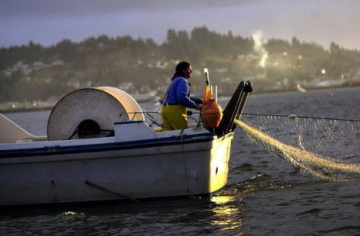 Four powerful sportfishing groups have asked Oregon Gov. Kate Brown to keep the Oregon Fish and Wildlife Commission from significantly altering a plan to move gill-nets from the lower Columbia River in 2017. In a stern letter delivered Monday to the governor and commission, the coalition threatens to withdraw support from the Oregon Department of Fish and Wildlife if a revision to the Columbia River Plan is adopted. It was signed by representatives of the Northwest Sportfishing Industry Association, Association of Northwest Steelheaders, Coastal Conservation Association and the Northwest Guides and Anglers Association. Read the rest here 11:06
Four powerful sportfishing groups have asked Oregon Gov. Kate Brown to keep the Oregon Fish and Wildlife Commission from significantly altering a plan to move gill-nets from the lower Columbia River in 2017. In a stern letter delivered Monday to the governor and commission, the coalition threatens to withdraw support from the Oregon Department of Fish and Wildlife if a revision to the Columbia River Plan is adopted. It was signed by representatives of the Northwest Sportfishing Industry Association, Association of Northwest Steelheaders, Coastal Conservation Association and the Northwest Guides and Anglers Association. Read the rest here 11:06
Critics of Gill Nets Trying to Drive Fishery Offshore
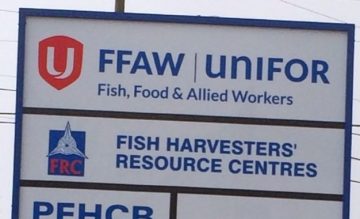 The Inshore Director for the FFAW says the latest allegations against the use of gill nets is nothing but an attempt to drive the industry offshore. Bill Broderick says the fishery has changed since its early beginnings in the province. He says if we’re going to build an industry we need to build it around a focus on quality rather than quantity. Former politician John Efford came out against the use of gill nets in commercial fishing because he says it affects the quality of the fish. Broderick says that allegation is an attempt to squeeze out the little guy. He says when the moratorium was called the conventional wisdom was if you shut down the capelin fishery, kill and the seals and stop using gill nets it would lead to utopia and we know now this was wrong. Link 13:22
The Inshore Director for the FFAW says the latest allegations against the use of gill nets is nothing but an attempt to drive the industry offshore. Bill Broderick says the fishery has changed since its early beginnings in the province. He says if we’re going to build an industry we need to build it around a focus on quality rather than quantity. Former politician John Efford came out against the use of gill nets in commercial fishing because he says it affects the quality of the fish. Broderick says that allegation is an attempt to squeeze out the little guy. He says when the moratorium was called the conventional wisdom was if you shut down the capelin fishery, kill and the seals and stop using gill nets it would lead to utopia and we know now this was wrong. Link 13:22
N.C. gill net limits hurt watermen’s livelihoods
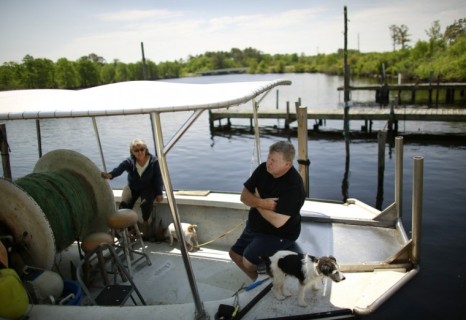 John Norris stiffly eased down into his flat-bottom boat using a small step ladder and a helping hand from his fishing partner and wife, Brenda. If he tilts too far, he falls over. Norris, a 68-year-old commercial waterman, is being treated for cancer. He’s had operations on both knees and shoulders, and he carries vertical and horizontal scars more than 12 inches long crisscrossing his torso. Read more here 09:57
John Norris stiffly eased down into his flat-bottom boat using a small step ladder and a helping hand from his fishing partner and wife, Brenda. If he tilts too far, he falls over. Norris, a 68-year-old commercial waterman, is being treated for cancer. He’s had operations on both knees and shoulders, and he carries vertical and horizontal scars more than 12 inches long crisscrossing his torso. Read more here 09:57






